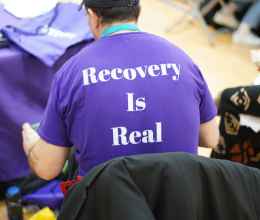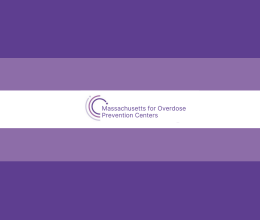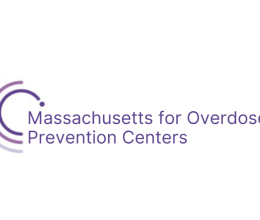
Massachusetts for Overdose Prevention Centers (MA4OPC) today hosted an event at the State House, demonstrating broad support for passing legislation to establish life-saving overdose prevention centers (OPCs) in the Commonwealth. Today’s event followed the release of new statewide data, showing overdose deaths have reached an all-time high in Massachusetts.
The MA4OPC coalition includes leading medical providers and experts including the Massachusetts Medical Society, Boston Medical Center, Fenway Health, the Massachusetts Health & Hospital Association, Massachusetts General Brigham, Tapestry Health Systems, the Massachusetts Public Health Association, and the Massachusetts Society of Addiction Medicine, as well as grassroots leaders in substance use support and recovery services. The coalition supports H. 1981 / S. 1242, which would create a 10-year pilot program authorizing OPCs, also called supervised consumption sites, in Massachusetts municipalities subject to approval by local boards of health.
According to the new data released today, there were 2,357 estimated overdose deaths in 2022, 2.5% more lives lost by preventable overdose deaths than the year before. While the overdose death rate for White non-Hispanic people decreased compared to 2021, overdose death rates rose dramatically for Black non-Hispanic people. Hispanic and Indigenous people also saw substantial increases in overdose death rates.
Currently, there are roughly 200 overdose prevention centers operating in 14 countries worldwide with no overdose deaths to date. Momentum is building throughout the country, led by states in New England, to take more aggressive public health measures in response to continued increases in overdose fatalities. New York City’s OnPoint program opened in 2021. The program was used by more than 2000 people in its first year and reversed 600 overdoses.
In response to repeated year-over-year increases in overdose deaths, Rhode Island lawmakers enacted a law in 2021 to create an OPC pilot program. Last month, state senators in Connecticut unanimously approved a similar bill. Also last month, lawmakers in Minnesota approved a law to create a network of “safe recovery sites” that offer harm reduction services including OPCs. Meanwhile, a 2021 study found that an overdose prevention center in Boston would save $4 million in reduced reliance on ambulance services, Emergency Department visits, and hospitalizations.
At today’s State House event, lawmakers and local municipal leaders, medical and public health professionals, and people directly affected by the opioid crisis conveyed the urgent need for OPCs in Massachusetts. OPCs are evidence-based, legally sanctioned harm reduction facilities where people who use drugs can safely consume pre-obtained drugs under supervision of trained healthcare workers. They are proven to prevent lethal overdoses, designed to curb the spread of infectious diseases, and can connect patients to resources such as drug treatment and recovery services.
Statements from people affiliated with today’s MA4OPC event at the State House
Sponsors of H.1981/S.1242
“No one has to look far to find someone they care about who has been impacted by substance use and addiction. We have just learned that there were more opioid-related overdose deaths in Massachusetts in 2022 than in 2021, which had been the deadliest year on record,” said Rep. Marjorie Decker. “Overdose prevention centers ensure that there are people and resources available to respond within those few crucial minutes, which often means the difference between life and death. The bill that I filed with Representative Fernandes and Senator Cyr would establish the legal and regulatory framework for communities to operate overdose prevention sites successfully."
“The overwhelming evidence shows that overdose prevention centers are an intervention that saves lives,” said Sen. Julian Cyr. “This harm reduction tool provides immediate help in the event of an overdose. With the fentanyl crisis continuing unabated, we cannot count out a proven and effective resource. Overdose prevention centers could serve as one of the game changers in Massachusetts in our efforts to end this epidemic.”
“Overdose Prevention Centers save lives and get people into treatment,” said Rep. Dylan Fernandes. “New York is already saving lives. Our legislative colleagues in Rhode Island and Minnesota have authorized overdose prevention centers, and Connecticut is fast following in their footsteps. The latest opioid numbers just released in Massachusetts serve as a devastating reminder of what’s at stake if we continue to fail to act.”
Speakers at the MA4OPC event
“The establishment of Overdose Prevention Centers is our very top priority. Why? Because it is an evidence-based intervention that can stop deaths right now, today,” said Miriam Komaromy, MD, Medical Director of BMC’s Grayken Center for Addiction, a member organization of MA4OPC.
“Last year, 2300 Massachusetts families suffered the pain and the agony of overdose deaths,” said Maryanne Frangules of the Massachusetts Organization for Addiction Recovery, a member organization of MA4OPC. “Where there is breath there is hope. If we can add Overdose Prevention Centers to our continuum of care we would offer that hope.”
“It is time to act. We know that overdose prevention centers save lives and that we urgently need new tools to help prevent overdoses. We also know they reduce the open use of substances and benefit the greater community. The path forward is clear,” said Somerville Mayor Katjana Ballantyne. “Increased access to substance misuse treatment could save the lives of so many of our friends, family members, and loved ones. Today, I'm proud to join Senator Cyr, Representative Decker, Representative Fernandes, and everyone from the Massachusetts for Overdose Prevention Centers Coalition to advocate for this incredibly important legislation, and call on the Commonwealth to join the fight against the state’s opioid crisis.”
Other Coalition Members
“The persistently high rate of deadly overdoses among Massachusetts residents is unacceptable,” said Ellen LaPointe, CEO of Fenway Health, a member organization of MA4OPC. “Every overdose is preventable. We must expand our public health approach to the overdose crisis and adopt evidence-based harm reduction services, including programs that are tailored to high-risk groups such as people LGBTQIA+ people, BIPOC people and those with intersecting identities. Overdose prevention centers are a cost-effective, proven tool to prevent opioid deaths and bring people into care.”
“The physicians of the Massachusetts Medical Society, after extensive research and discussion, voted in 2017 to support the establishment of an overdose prevention center (OPC) in Massachusetts,” said Dr. Barbara Spivak, president of the Massachusetts Medical Society, a member organization of MA4OPC which authored a 2017 study of OPCs that served as the centerpiece of advocacy efforts in support of a pilot OPC in the state. “The support of a pilot site was based on comprehensive data — the evidence base has only grown since — demonstrating such facilities save the lives of our patients who struggle with substance use disorder. As we continue to see rising overdose deaths with widening disparities and the striking increase of illicitly manufactured fentanyl and other synthetics in the drug supply, we urge the Commonwealth to utilize every harm-reduction tool available to reduce overdoses and to provide another pathway to treatment and rehabilitation. It is heartbreaking to continue to lose our patients when there exists a proven, yet not utilized approach to save lives and help treat this chronic disease that can affect anyone, regardless of race, gender, sexuality, or social class.”







